All the big film festivals are front-loaded. The first five or six days always seem to comprise 85% or 90% of the ballgame. Not to complain and par for the course, but the first weekend of the Toronto Film Festival — Friday, 9.7 to Sunday, 9.9 — is fairly jammed with parties. Saturday stands out with three big ‘uns happening almost simultaneously. A No Country for Old Men dinner party and the annual Sony Pictures Classics party at Michelle’s Brasserie starting at 8 pm, and then the doors opening for a Fox Searchlight party for Juno, The Savages and Under The Same Moon at 8:30 pm. Too many balls in the air.
Day: August 27, 2007
Why “Champ” Died
“In real life people step over homeless people, and they’re certainly not going to pay ten bucks to see a movie about one.” — An actor who shall be nameless explaining why Resurrecting The Champ, about a sports writer (Josh Hartnett) who writes a big story about having discovered a former champion boxer from the 1950s (Samuel L. Jackson) who’s since become a scuzzy homeless bum with a “whinny” voice, died last weekend at the box-office.
Old ideas, new ideas
“Hollywood is not just running out of new ideas — it’s running out of old ideas.” Who said this? Obviously applies to the here-and-now. Can’t find the source online.
Klaatu barada whoa
The interesting thing isn’t Keanu Reeves being cast as “Klaatu,” a sophisticated, well-spoken alien who brings a dire warning to everyone on earth in a “re-imagining” of the 1951 sci-fi classic The Day the Earth Stood Still. The interesting thing is Variety‘s Michael Fleming reporting that producer Erwin Stoff and 20th Century Fox are envisioning a series of Reeves /Klaatu films — i.e., a “tentpole” opportunity.
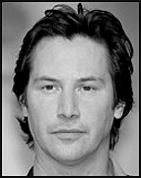
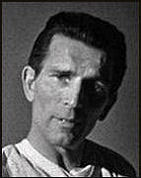
Keanu Reeves, Michael Rennie
From Michael Rennie to Keanu Reeves — a clear-cut example of cultural devolution. Klaatu barada whoa.
Reeves “committed over the weekend to play Klaatu, a humanoid alien who arrives on Earth accompanied by an indestructible, heavily armed robot,” Fleming reported, “[along with a] warning to world leaders that their continued aggression will lead to annihilation by species watching from afar. The 1951 film’s premise, a response to the rise of the Cold War after WWII, is being updated, and the film will use advances in visual effects.”
So how do you keep this going as a tentpoler? Reeves/Klaatu delivering warning after warning and getting more and more pissed when humans ignore him? Reeves/Klaatu falling in love and deciding to stay on earth and taking up permanent residence in suburban Virginia? Klaatu running for President, starting a business…? Every continuing scenario idea sounds ridiculous. It’s a single, stand-alone film — Klaatu warns earth to shape up or else…that’s it.
Scott Derrickson (The Exorcism of Emily Rose) directing from a script by David Scarpa. Pic will either start shooting in the late fall or early 2008.
Owen Wilson’s sadness
I never write about personal stuff unless it’s an occasion for a snarky joke, or unless an actor’s dependency issue has been revealed in such a way that it’s become a big unavoidable news story (like the pull-overs involving Mel Gibson or Lindsay Lohan, say). But this time I’m feeling something else — a tremendous sadness over a near-tragedy, and a kind of anger about the usual Hollywood response to such things, which is to brush it under the carpet.
I’m a Libertarian in the sense that I think people are fully entitled to do anything they want to their bodies without prosecution from the law, but yesterday’s Owen Wilson episode is different for four reasons. I used to know him, I residually care about him, I’ve loved almost every one of his performances, and I think what apparently happened yesterday was a subconscious attempt on his part to bring certain matters to the fore.
In other words, by dramatizing his issues in this fashion, Owen has half-intentionally sparked a conversation that will amount to a kind of public intervention. A tree didn’t fall on Owen yesterday, but at the same time I don’t think he really meant to do what he apparently attempted to do.
Wilson has toldTMZ.com that “I respectfully ask that the media allow me to receive care and heal in private during this difficult time.” On a personal healing note it’s obviously no one’s business but his. I would never allude to anything ever — there are dozens of stories that get around that I’ve never touched — but at the same time Wilson knew before doing this to himself that whatever the outcome it would be a huge story and widely commented upon.
I’ve known a guy for a long time who’s known Owen for a long time, and this guy has been telling me all along that there have been Owen issues that have never really gone away…not really. I could never quite make sense of this because Owen always worked so much and had been so productive. He looked terrific — bright smile, good color, alive and crackling — when I saw him with Kate Hudson last April in San Francisco at Cafe Trieste in North Beach.
A close Wilson friend calls this matter “a heartbreak…a real heartbreak. I’m so damn sad I really don’t know what else to say. I’m in tears. I just feel so bad for him and now [for him] to have to go through it publicly…” I don’t want to drag anyone through any personal muck, but life is choices and to continue living it’s sometimes necessary to stop playing the same old game that we all play when someone has a problem, which is never to talk about it until they’re dead. It’s only allowable to talk about how much they’re liked and how much talent they have and how much we care for them, followed by a shrug of the shoulders and “Oh, well…not my business.”
The guy I know spoke this morning to a Dallas guy who also knows Owen from way back when, and the Big D guy said that what apparently happened is a “hinky” thing for Owen to have done. (“Hinky” is Dallas slang for “sissy.”)
“This has always been Owen’s life,” my source says. “He’s always been this little child, this quick-witted survivor. His canniness and his cunning in order to survive has been all over his movie characters since the beginning. He’s Dignan, he’s all those guys.
“Owen figured out a long time ago that if you act, you don’t have to work. He’s a great writer, but he has no discipline. But he’s got this character, this persona — he plays the same guy every time, and it connects to who he is and in a general way to his generation, and he created this character on his own.”
A colleague told me this morning that “its really just so sad — I feel for him and his family. I hope Owen make its through this and gets stronger from it.”
Get the bad guys!
There’s an 8.26 David Halbfinger N.Y. Times piece that searches for meaning in two noteworthy rage-and-revenge movies — Neil Jordan‘s The Brave One (Warner Bros., 9.14) and James Wan‘s Death Sentence (Fox Atomic, 8.31) with Jodie Foster and Kevin Bacon, respectively — as well as the less prominent Descent, which starred Rosario Dawson, and a British revenge movie called Outlaw, which starred Sean Bean.
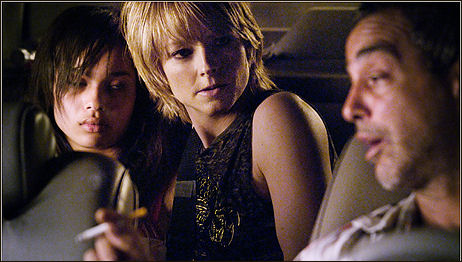
The piece asks whether audiences today might be ready for a new wave of cathartic, rough justice at the movies. Halbfinger quotes original “Death Wish” author Brian Garfield as saying that “people are just sort of simmering with the kind of anger that they can’t really define, and this kind of movie gives them some kind of release.” But this anger seems incompletely defined by Halbfinger also.
Street crime, after all, is not the nationwide virus or pestilence it once seemed to be. New York City is thought to be a much safer place it was in the early ’70s, when Garfield wrote the book, or when the Michael Winner-Charles Bronson film of Death Wish came out in ’74.
I think these films are about getting revenge upon a general “themn” — an unruly, assaultive, disenfranchised element that would puncture our indoor-shopping-mall complacency and invade our air-conditioned membranes inside our SUVs. This includes not just criminals but the whole Middle Eastern crew..anyone lobbing grenades in our direction. In this sense the best post-9.11 revenge movie of them all has been Tony Scott‘s Man on Fire — a movie that Bush and Cheney probably loved, and which I genuinely respected as one of the best right-wing propaganda films ever made.

150 minutes of “Caution”
Writing in an 8.26 N.Y. Times piece about Ang Lee‘s Lust, Caution, which will show at the Venice and Toronto film festivals before opening on 9.28, Dennis Lim has reported that the film, which is in Mandarin, “runs two and a half hours.” He also says that the sex scenes between Tony Leung and Tang Wei, which resulted in an NC-17 rating judgment a few days ago, are “notably revealing and acrobatic.”
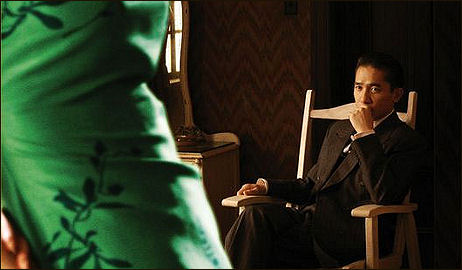
Gonzalez is gone
“Turning and turning in the widening gyre, the falcon cannot hear the falconer. Things fall apart, the center cannot hold, and mere anarchy is loosed upon the world. The blood-dimmed tide is loosed, and everywhere the ceremony of innocence is drowned. The best lack all conviction while the worst are full of passionate intensity.” — W.B. Yeats, “The Second Coming.”
Beatty and the sound of cannons
Another looking-back-on-Bonnie and Clyde-40-years-later piece? This one being from London (i.e., the Guardian‘s Philip French), it reminds me of Warren Beattys’ story of a London freakout he experienced with this film, and how it all began with his wanting the Bonnie and Clyde gunfire to have a cannon-roar sound like the guns in Shane, and how Beatty gone to director George Stevens and asked him how to create the exact same sound.
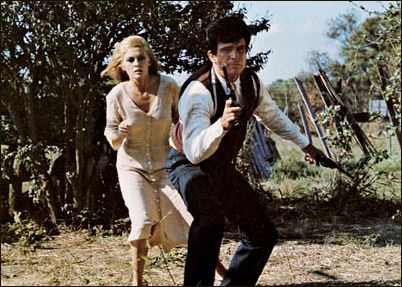
Flash forward to the the film’s late-1967 premiere in London (at a prime theatre in Leicester Square), and Beatty noticing that the gunfire sounded soft and muffled.
Enraged, Beatty runs upstairs to the projection booth to see what’s up. The projectionist, surprised to see Beatty, tells him that he ran Bonnie and Clyde earlier that afternoon and realized it had an atrocious sound mix, especially regarding the gunfire. So he did Beatty a favor by making up a time chart telling him at what exact points to turn down the sound as the gunfire wouldn’t sound so cannon-like. “This is one of the worst mixed films I’ve ever seen,” the guy said . “In fact, I haven’t seen a film mixed this badly since Shane.”
